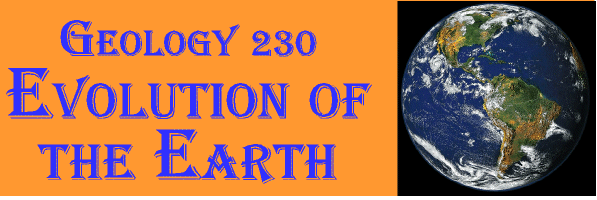
What is Historical Geology
233 Miller Hall - phone 6531
Historical geology is about the origin and history of the Earth and everything on and in it, through 4.5 billion years of time. But, more it is the history of the discovery of that history and our ongoing struggle to understand a very complicated planet that does not lend itself to the simple diagnosis characteristic of the classical sciences. Knowledge that the Earth is a very old planet is a relatively recent discover whose ramifications are still reverberating through our culture.
What is historical geology - continued from home page.
Part of the problem of Earth history was the discovery of history itself. During most of recorded human history, history did not exist. What did exist was the myth of the eternal return, the notion that the universe is eternal and time is cyclical, with events repeating over and over again - like the beating of a heart, the waxing and waning of the Moon, the cycling of the seasons . The Babylonians, for example, developed a cosmic model based on periodicities of the planets in which each Great Year lasts 424,000 years. In a cyclical universe it is impossible even to frame the question of an age of the Earth - for it has no beginning.
In ancient history, however, one culture shunned the notion of a cycling eternity. In the Judaic tradition the history of the world was a narrative; a simple story, with a beginning, a middle, and an end, spanning time from God's creation of the world on the first day all the way to the end of things. With the emergence of Christianity this story was elaborated further, with detailed revelations of what would come at the end of time. St. Augustine completed this great time-mapping project, argued, "God forbid that we should believe in [the Eternal Return].' From this we get the idea that history does exist, but Augustine froze the idea of time. It became an essential doctrine of faith - a doctrine it would be heretical to deny - to believe that the Earth was, as James Ussher calculated, anything but 6000 years old. Human history and Earth history were one and the same, indivisible.
It was out of this cultural belief system that the immense age of the Earth had to be wrested, and it took most of the 18th and 19th centuries to do it. But, by the end of the 19th century geology as the study of the Earth's deep time had separated itself from its religious roots and entered the mainstream of scientific investigation. This transition did not occur in isolation. Rather it emerged along with one of the most dramatic and far reaching transitions in human history, the Industrial Revolution and its handmaid, the Scottish Enlightenment. Much of what we consider the modern world was created during this time with such seminal thinkers as Adam Smith ("Wealth of Nations"), David Hume (generally regarded as the most important philosopher ever to write in English), James Watt (inventor of the steam engine), James Boswell (author and essayist), John Playfair (geologist, physicist, mathematician), Thomas Malthus ("Essay on the Principle of Population"), and a host of others including James Hutton and Charles Lyell who more than anyone established geology as a scientific discipline.
But, the Earth is a large and messy subject, withering in its complexity and mysteries. Unlike the classical sciences the Earth does not lend itself to simple descriptions or mathematical modeling. Much of what geology is concerned with, after all, is far below the surface where we cannot go, and much that is at the surface is accessible only with great difficulty - the Antarctic, or Amazon rain forest, or Siberia.
Consequently, unraveling the Earth's history has been a long slog - and we are far from done. Today much of our work requires not only the interpretation of rocks (by the hundreds) and fossils (from microscopic bacteria to giant dinosaurs), but also the intricate biogeochemical cycling that drives the Earth system. Today's historical geologist must be versed in all the scientific disciplines, as new tools, new skills, and new knowledge are finally allowing us to begin to think about the Earth and its history as a whole - as a system. The problem and the challenge for the future is that science is just beginning to grapple with this idea of systems - what they are, how they work, and how they evolve. This is by far the most exciting time to be studying the Earth and its history. It promises to transform our entire viewpoint.
Return to GenSci 230: Evolution of the Earth home page